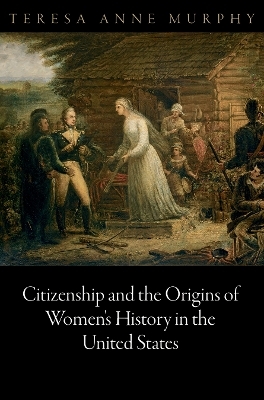
Citizenship and the Origins of Women's History in the United States
Seiten
2013
University of Pennsylvania Press (Verlag)
978-0-8122-4489-2 (ISBN)
University of Pennsylvania Press (Verlag)
978-0-8122-4489-2 (ISBN)
Citizenship and the Origins of Women's History in the United States challenges twenty-first-century assumptions of nineteenth-century women's history by tracing the ways women's history was politicized, particularly in light of the growing activism of women and the first woman's rights movement.
Women's history emerged as a genre in the waning years of the eighteenth century, a period during which concepts of nationhood and a sense of belonging expanded throughout European nations and the young American republic. Early women's histories had criticized the economic practices, intellectual abilities, and political behavior of women while emphasizing the importance of female domesticity in national development. These histories had created a narrative of exclusion that legitimated the variety of citizenship considered suitable for women, which they argued should be constructed in a very different way from that of men: women's relationship to the nation should be considered in terms of their participation in civil society and the domestic realm. But the throes of the Revolution and the emergence of the first woman's rights movement challenged the dominance of that narrative and complicated the history writers' interpretation of women's history and the idea of domestic citizenship.
In Citizenship and the Origins of Women's History in the United States, Teresa Anne Murphy traces the evolution of women's history from the late eighteenth century to the time of the Civil War, demonstrating that competing ideas of women's citizenship had a central role in the ways those histories were constructed. This intellectual history examines the concept of domestic citizenship that was promoted in the popular writing of Sarah Josepha Hale and Elizabeth Ellet and follows the threads that link them to later history writers, such as Lydia Maria Child and Carolyn Dall, who challenged those narratives and laid the groundwork for advancing a more progressive woman's rights agenda. As woman's rights activists recognized, citizenship encompassed activities that ranged far beyond specific legal rights for women to their broader terms of inclusion in society, the economy, and government. Citizenship and the Origins of Women's History in the United States demonstrates that citizenship is at the heart of women's history and, consequently, that women's history is the history of nations.
Women's history emerged as a genre in the waning years of the eighteenth century, a period during which concepts of nationhood and a sense of belonging expanded throughout European nations and the young American republic. Early women's histories had criticized the economic practices, intellectual abilities, and political behavior of women while emphasizing the importance of female domesticity in national development. These histories had created a narrative of exclusion that legitimated the variety of citizenship considered suitable for women, which they argued should be constructed in a very different way from that of men: women's relationship to the nation should be considered in terms of their participation in civil society and the domestic realm. But the throes of the Revolution and the emergence of the first woman's rights movement challenged the dominance of that narrative and complicated the history writers' interpretation of women's history and the idea of domestic citizenship.
In Citizenship and the Origins of Women's History in the United States, Teresa Anne Murphy traces the evolution of women's history from the late eighteenth century to the time of the Civil War, demonstrating that competing ideas of women's citizenship had a central role in the ways those histories were constructed. This intellectual history examines the concept of domestic citizenship that was promoted in the popular writing of Sarah Josepha Hale and Elizabeth Ellet and follows the threads that link them to later history writers, such as Lydia Maria Child and Carolyn Dall, who challenged those narratives and laid the groundwork for advancing a more progressive woman's rights agenda. As woman's rights activists recognized, citizenship encompassed activities that ranged far beyond specific legal rights for women to their broader terms of inclusion in society, the economy, and government. Citizenship and the Origins of Women's History in the United States demonstrates that citizenship is at the heart of women's history and, consequently, that women's history is the history of nations.
Teresa Anne Murphy is Associate Professor of American Studies at George Washington University and author of Ten Hours' Labor: Religion, Reform, and Gender in Early New England.
Introduction
I.
Chapter 1. Domestic Citizenship and National Progress
Chapter 2. Revolutionary Responses
Chapter 3. The Challenges of Radical Reform
II.
Chapter 4. Women's History and Woman's Rights
Chapter 5. Domestic Histories
Chapter 6. Caroline Dall's Usable Past: Women and Equal Citizenship
Epilogue
Notes
Index
Acknowledgments
| Erscheint lt. Verlag | 19.4.2013 |
|---|---|
| Reihe/Serie | Democracy, Citizenship, and Constitutionalism |
| Verlagsort | Pennsylvania |
| Sprache | englisch |
| Maße | 152 x 229 mm |
| Themenwelt | Geisteswissenschaften ► Geschichte ► Regional- / Ländergeschichte |
| Recht / Steuern ► EU / Internationales Recht | |
| Recht / Steuern ► Öffentliches Recht ► Besonderes Verwaltungsrecht | |
| Sozialwissenschaften ► Politik / Verwaltung | |
| ISBN-10 | 0-8122-4489-3 / 0812244893 |
| ISBN-13 | 978-0-8122-4489-2 / 9780812244892 |
| Zustand | Neuware |
| Haben Sie eine Frage zum Produkt? |
Mehr entdecken
aus dem Bereich
aus dem Bereich
Erinnerungen
Buch | Softcover (2024)
Pantheon (Verlag)
16,00 €
Universalgelehrter, Polarreisender, Entdecker
Buch | Hardcover (2024)
mareverlag
28,00 €


